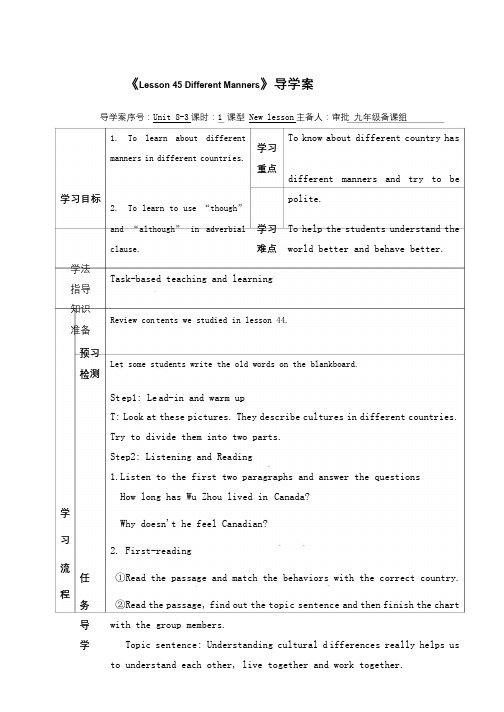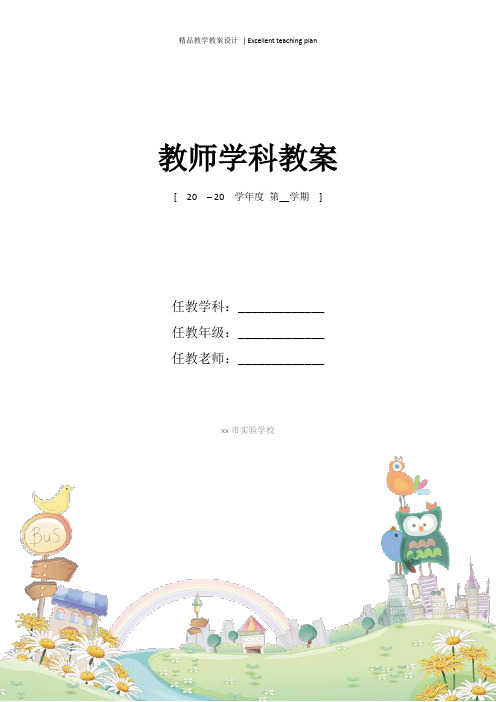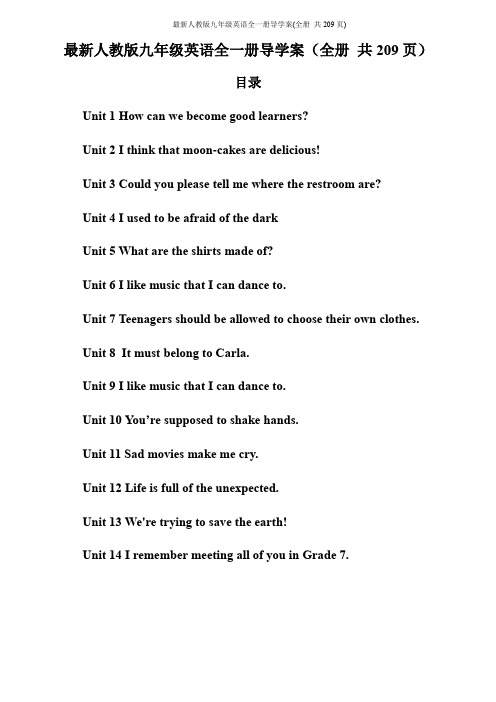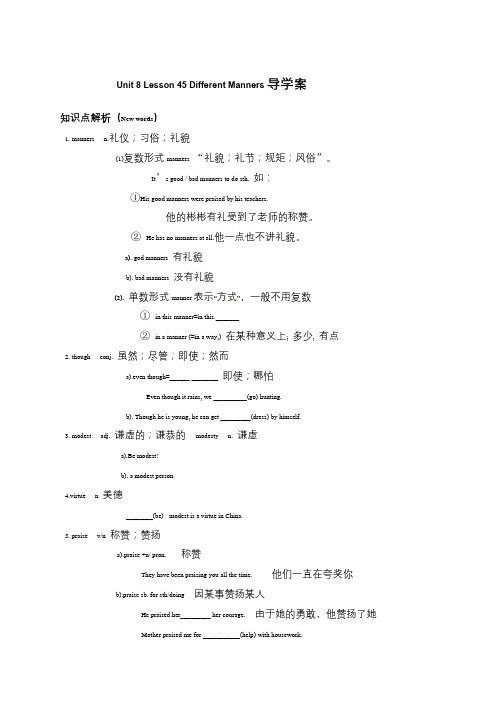殪虎桥中学九年级英语导学案45
冀教版九年级英语全册Unit 8 Lesson 45 导学案

《Lesson 45 Different Manners》导学案导学案序号:Unit 8-3课时:1课型New lesson主备人:审批九年级备课组1. To learn about different To know about different country has学习manners in different countries.重点different manners and try to be 学习目标polite.2. To learn to use “though”and “although”in adverbial 学习To help the students understand theclause. 难点world better and behave better.学法Task-based teaching and learning指导知识Review con tents we studied in lesson 44.准备预习Let some students write the old words on the blankboard.检测St ep1: Le ad-in and warm upT: Look at these pictures. They describe cultures in different countries.Try to divide them into two parts.Step2: Listening and Reading1.Listen to the first two paragraphs and answer the questionsHow long has Wu Zhou lived in Canada?学Why doesn't he feel Canadian?习2. First-reading流任①Read the passage and match the behaviors with the correct country. 程务②Read the passage, find out the topic sentence and then finish the chart 导with the group members.学Topic sentence: Understanding cultural d ifferences really helps us to understand each other, live together and work together.达标Fin i sh the Exercise Two on Page 119.检测Extensive reading:T: Do you know any table manners?T: Read the item and list the Dos and Don’tsTable Manners for Children拓Dos Don’ts 展延伸学习Get the students to say what they learnt this lesson.小节1. Make a project about different manners in one of the countries you’dlike to travel to.作业布置2. Give us a report about it next time!3. Finish the exercises on Page 119.课后反思。
冀教版九年级英语全册Lesson45DifferentManners教学设计

3.鼓励学生利用网络、书籍等资源,了解一个自己感兴趣的国家或地区的交际礼仪,完成一份图文并茂的报告。报告内容包括:该国家或地区的文化背景、典型交际礼仪、与自己国家交际礼仪的异同等。
4.结合中华文化,让学生思考如何用英语向外国朋友介绍中国的传统礼仪,如:拱手礼、跪拜礼等。要求学生撰写一篇短文,字数在100-150词左右。
5.完成课后练习册中与本节课相关的练习题,巩固所学知识。
作业布置要求:
1.作业内容要结合学科知识和课本内容,注重实践性和趣味性;
2.学生需认真完成作业,确保作业质量,提高自己的跨文化交际能力;
2.重点:培养学生运用一般现在时和一般过去时描述不同文化背景下交际礼仪的能力。
难点:学生在实际交流中,如何灵活运用时态进行准确表达。
3.重点:通过本节课的学习,增强学生对中华文化的了解和认同。
难点:如何将文化教育融入英语教学中,实现跨学科教学。
(二)教学设想
1.创设情境,激发兴趣:通过展示不同文化背景下的交际场景,激发学生的学习兴趣,引导他们关注文化差异。
2.小组内讨论以下问题:
a. What are the typical manners in this culture?
b. How do people greet, apologize, and express gratitude in this culture?
c. Can you give some examples to illustrate these manners?
Lesson39-40学案

达标 训练
【without 的用法】 1. water, we can’t live. A. in B. with C. out D. without 2.He has left without anything. A. say B. to say C. says D. saying 【探究二:communicate 的用法】 3.青少年们应该好好跟他们的父母亲交流。 【it 作形式主语和形式宾语的句型】 4.It’s to learn to swim. I want to give up. A. easy B. important C. difficult D. nice 5.It’s very kind you to help the old man. A. on B. with C. for D. of
探究一:translate 的用法 合作 探究 探究三:in different ways 的用法
探究二:go up 的用法 合作 探究 探究三:it 作形式主语和形式宾语的句型
达标 训练
【translate 的用法】 1.Do you know who can the sentence English? A. translate, on B. translate, into C. translate, in 【go up 的用法】 2.The sun in the east in the morning. A. go down B. go to C. goes up 【in different ways 的用法】 3.你可以用不同的方式解决同一个问题。 You can solve the same problem 4.这是你我之间的秘密。 It’s a secret you me. 5.我给了他忠告,而不是钱。 I give him advice money. 1.现在完成时态的被动语态的结构: 2.remember to do 与 remember doing 的区别 3.“发音,读法”的动词与名词形式
九年级英语Lesson 45教案新部编本

教师学科教案[ 20 – 20 学年度第__学期]任教学科:_____________任教年级:_____________任教老师:_____________xx市实验学校九年级英语Lesson 45: Different Manners教学设计Ⅰ、Learning aims:(教学目标)1、Learning and remembering the new words, understanding thephases.(识记单词,会理解运用本课短语)。
2、To read and translate the text.(会读,会翻译课文)。
3、To know cultures shape manners .Ⅱ、Difficulties and importance(教学重点和难点):1、掌握下列短语:①take turns.②pay for2、It的用法。
(形式主语)Ⅲ、Teaching and learning steps:(教学过程)Step 1:Class opening情景导课:板书课题。
见课件1、2张。
Step 2:Self-learning (自主学习)见导学案自主学习2、3。
(1)课文朗读:分角色朗读课文.(一,二,三,四、五、六组朗读课文,每组读一自然段,老师纠正发音。
)(2)检查短语和句子:①、五组六位同学在后面黑板展演导学案的自主学习2、3题(默写),②、组长用红粉笔对改,中心发言人讲解佳句赏析,之后其他小组纠错,点评。
Step3:Co-operative studying(合作学习):见导学案。
Step4:Exhibition and exchange.(展示交流)(1)总结confident的用法以及相关短语。
一组同学台前展示合作学习1,并有中心发言人在前黑板展演探究结果。
(其他小组补充知识并点评,老师点拨。
)(2)思考名词后加ly构成形容词和副词的用法。
举例说明,二组同学台前展示合作学习2,并由中心发言人在前黑板汇报展演探究结果。
最新人教版九年级英语全一册导学案(全册 共209页)

最新人教版九年级英语全一册导学案(全册共209页)目录Unit 1 How can we become good learners?Unit 2 I think that moon-cakes are delicious!Unit 3 Could you please tell me where the restroom are?Unit 4 I used to be afraid of the darkUnit 5 What are the shirts made of?Unit 6 I like music that I can dance to.Unit 7 Teenagers should be allowed to choose their own clothes.Unit8It must belong to Carla.Unit 9 I like music that I can dance to.Unit10You’re supposed to shake hands.Unit 11 Sad movies make me cry.Unit 12 Life is full of the unexpected.Unit 13 We're trying to save the earth!Unit 14 I remember meeting all of you in Grade 7.Unit 1 How can we become good learners?to be patient4. Try to guess a word’s meaning by reading the sentences before and after it.sentence n.Please use this word to make a sentence. make a sentence 五、练评(包含“考点链接” 应用探究 6分钟) 单项选择。
冀教版英语九年级全册导学案Lesson 45

Unit 8 Lesson 45 Different Manners 导学案知识点解析(New words)1. manners n.礼仪;习俗;礼貌(1)复数形式manners “礼貌;礼节;规矩;风俗”。
It’s good / bad manners to do sth. 如:①His good manners were praised by his teachers.他的彬彬有礼受到了老师的称赞。
②He has no manners at all.他一点也不讲礼貌。
a). god manners 有礼貌b). bad manners 没有礼貌(2). 单数形式manner 表示“方式”,一般不用复数①in this manner=in this _______②in a manner (=in a way,) 在某种意义上; 多少, 有点2. though conj. 虽然;尽管;即使;然而a).even though=______ ________ 即使;哪怕Even though it rains, we __________(go) hunting.b). Though he is young, he can get _________(dress) by himself.3. modest adj. 谦虚的;谦恭的modesty n. 谦虚a).Be modest!b). a modest person4.virtue n 美德________(be) modest is a virtue in China.5. praise v/n 称赞;赞扬a).praise +n/ pron. 称赞They have been praising you all the time. 他们一直在夸奖你b).praise sb. for sth/doing 因某事赞扬某人He praised her_________ her courage. 由于她的勇敢,他赞扬了她Mother praised me for ___________(help) with housework.我帮忙做家务,妈妈表扬了我c). He won praise ________ his modesty. 他因自己的谦虚赢得了表扬d). in praise of…赞扬,称赞6. private adj.私人的;私有的a). in private 私密地;私下地We can only talk about this matter _______ __________.我们只能私下谈论这件事b). Don’t repeat what I’ve told you to anyone. It’s private.不要向任何人转述我告诉你的事,它是私密的。
九年级英语上册学案 Lesson 45
九年级英语上册Lesson 45 学案高碑店市第五中学英语组集体备课主备人:高东芳【Learning objectives】学习目标:Knowing:掌握6个单词3个短语【Important points】学习重点:1、instead 与instead of的区别2、prevent…from doing 的用法3、leave something\someone alone【Difficult points】学习难点:祈使句肯定形式与否定形式【Learning process】学习过程:I、自主学习词汇⑴词形转换prevent_______(n.)________(p.t.)_________(p.p.) electrical__________(n.)slip________(p.t.)_______(p.p.)_________(v-ing) knife_________(pl)drown________(p.t.)_______(p.p.) dangerous________(比较级)________(最高级) burn_______(p.t.)________(p.p.) serious___________(adv)safe_______(adv)______(n.)_________(比较级)_______(最高级)careless_________(反义词)_________(比较级)____________(最高级)⑵英汉互译1、阻止这些事故_________________2、小心___________ ____________3、在……边缘__________________4、两个最危险的房间__________________5、保持地板干燥_________________6、用刀要小心________________________7、生火_____________8、点火______________9、玩火____________________ 10、在着火_____________ 11、着火___________ 12、hurt oneself____________ 13、fall off____________ 14、leave someone\something alone________________ 15、Don’t slip___________ 16、get out of__________17、instead of____________ II、学习课文,掌握语言点1.Could people prevent these accidents?⑴prevent 为动词,意思是“防止,预防,阻止”。
冀教版九年级lesson44,45导学案
1.眼见为实2.行业;阶层3.充满4.举例5.鼓励某人做某事6.与···相似7.放弃8.除了Explaination (8:27-8:36)(10:47-10-56)一.考点:(1)give an example 举例子(2)give an example to sb.给某人举例子(3)for example 例如,(4)set an example to sb.为某人树立榜样(5)follow sb.’s example, 学习某人的榜样Eg. (1)他决定举个例子。
He decided ____ ____ ____ _____ .(2)Can you give us an example ? (同义句)Can you give ______ _______ ______ ______ ?(3)我们必须为小男孩树立榜样。
We must __________________________ this young boy.二. be full of 充满···的(同义词)be filled withEg. 1)瓶子里装满了水。
The bottle ___ ____ _____ water .2)Look out ! The cup is _______ hot water .A.full of B.fill with C.full D.fulled of3)They are filled ______ meanings .A.of B.in C.from D.with三.other than 而不是;除···以外Eg. 1)除了约翰以外,那儿一个人也没有。
_______ _____ John , no one was there .2)All parts of the house _____ one of the windows were still in good condition .A. other thanB.rather thanC.less thanD.more than拓展:1)other than = not , instead of “不,而不是” 2) other than= except , but 除···以外3)=besides 除···之外还···Self-check (8:36-8:40)(10:56-11:00)1.She was in doubt ____________ (是否)she was right .2.The customs in Qingdao are ______________ (相似的)to those in Yantai .3.Jim shared his apple ______ his brother .A.in B.on C.with D.from4.____ apple a day keeps the doctor away .A . A B.An C.The D./5.______ he will come or not hasn't been decided yet.A. WhetherB. IfC. ThatD. What6. Your suitcase is ______ to mine. I don't know which one to choose.A. sameB. similarC. likeD.likelybe full of, be similar to , give up, other than , walks of life7.It's a pity to _______ the job.8.The room ______________beautiful flowers.9.The representatives (代表) from different ____________will have a meeting in Beijing.10. My shoes _____________the ones you had on yesterday.11. She has no close friends ___________ him。
九年级英语教案lesson45
九年级英语教案Lesson 45Step One Check the answersFind out how much the Ss know about the USA. Ask questions like these: Whats the capital of the USA? Name another big city. Who is the President? What money do they use in the USA? What do they eat and drink? Put any useful facts and key words that arise out of this discussion on the Bb.Step Two PresentationSB Page 67, Part 1. Say Now read the dialogue silently and find out the answer to this question: How does Charlie advise Eric to spend his holiday? Write this question on the Bb. Allow the Ss a few moments to carry out the task. Check the answer. (Hire a car; visit some National Parks; go camping and take some friends with him.) See if the Ss can guess the meaning of downtown.Step Three DialogueSpeech Cassette Lesson 45. Play the tape of the dialogue for the Ss to listen and follow. Go through the dialogue briefly and make sure the Ss understand it. Play the tape again. This time the Ss listen and repeat. Then let the Ss practise the dialogue in pairs. You may wish to ask one to act thescene in front of the class.Wb Lesson 45, Ex. 1. Get Ss to ask and answer the questions in pairs. Then check several pairs in class.Step Four PracticeSB Page 67, Part 2. Read the introduction aloud. Get Ss to read through the phrases for giving advice on the left and the verbs on the right. When they have done this, point out that all the phrases on the left take an infinitive verb form, except What /How about... ? both of which take verb-ing. Get Ss to practise these forms in pairs, taking turns as the person giving advice. Then get Ss to shut their books and have a dialogue like the one in Part 1, but advising a visitor to China. Demonstrate with a good student first, taking the part of the Chinese person giving advice. Then put the Ss in pairs for the dialogue.Step Five WorkbookWb Lesson 45, Ex. 2.Ex. 2 can be done in Step 4 as a model dialogue on advising a visitor to China. Ss have to go through it and try to complete it themselves. Then collect the answers from the class. Finally call out a few pairs to act out the dialogue. Step Six ConsolidationGet groups of four Ss to have a dialogue like the one in Part 1 with their books shut. Two of the Ss are foreigners, and the other two are Chinese people giving advice. HomeworkFinish off the Workbook exercises.。
冀教版英语九年级全一册 Unit 8:Lesson 45 Different Manners 导学案
九年级英语Lesson 45 Different Manners.导学案Learning aims:1.Knowledge Objects(1) Key Vocabulary: though praise private(2) Target language: Though I have lived here for a long time, I still don’t feel Canadian.2.Ability Objects:To train students’ listening,speaking ,reading and writings skills using the target language.3.Moral ObjectsDifferent countries have different customs. So understanding cultural differences really helps us to understand each other, live together and work together.Important and Difficult points:Teaching Key PonitTo make students learn and grasp the key vocabulary words and the target language.Teaching Difficult PonitsTo train student’s listening. speaking. reading and writing skills To train students’ communicative competenceType of the lesson:New classTeaching resources:recorder, pictures or cardsTeaching stepStep1:Lead-inCheck the preview.Ask some students to read the words loudlyStep2:1)Review1.Read the text of last lesson.2.Review key points of lesson 44and use them to make up new sentences.2)Think about it:1.In your opinion, what are good manners?2.Do you think cultures shape manners?3)learning aims.1. To learn about different manners in different countries.2. To learn to use “though” and “although” in adv erbial clause.3. To help the students understand the world better and behave better.Step3.New class1. Ask the students to read the text as quickly as they can so as to understand the text. After that ask them to finish exercise 1 of Let’s do it .Step4. Language points: Adverbial clause with “though” and “although”“Although/ though” and “but” are used when there is a contrast between two objects. You shouldn’t use “but” and “although”together.Step5: Practice:根据汉语意思完成句子。
- 1、下载文档前请自行甄别文档内容的完整性,平台不提供额外的编辑、内容补充、找答案等附加服务。
- 2、"仅部分预览"的文档,不可在线预览部分如存在完整性等问题,可反馈申请退款(可完整预览的文档不适用该条件!)。
- 3、如文档侵犯您的权益,请联系客服反馈,我们会尽快为您处理(人工客服工作时间:9:00-18:30)。
学校:殪虎桥中学备课组:英语组学科:英语主备人:汪洲审核人贾小瑜年级:九年级班级:组名:姓名:
Lesson45 Different Manners
教学目标:
1.牢固掌握重点单词、短语、句型,提升语言表达能力。
2.通过自主学习、合作探究,掌握用英语介绍自己国家的manners。
3.全力以赴,激情投入,享受学习的快乐!
教学重点:
1.重点单词、短语、句型。
2.学习中国的传承美德。
教学难点:
能灵活运用所学知识,提高自己发现并解决题的能力。
课型:新授
课时:一课时
导学流程:
一、温故知新,导入新课:
1. 充分预习,熟读课文,认真研究导学案。
运用好双色笔,在课本上划出重点单词短语句型,标注出自己不懂的问题。
2. 限时自主完成,规范书写,独立思考;小组合作探讨,答疑解惑。
课前预习快乐体验
二、预习反馈,相互交流:
(一)在文中勾画出重点单词、短语,并结合语境猜测其含义,完成英译汉
1.modest _________
2. virtue______________
3.praise______________
4. private____________
5.elderly_____________
6.guest_______________
7.waiter__________ 7. Tip ______
8. In your opinion______ 9. Sound like ______
10.be common _______ 11. Take turns _____
三、教师精讲,合作探究:
探究一:
.1.In your opinion, what are good manners?
In one’s opinion 依某人看来,根据某人的看法。
[例句]Love is a feeling of one 's heart , in my opinion.
以我之见,爱是一种心灵感觉。
2.I have lived in Canada for twenty-three years.
思考:(1)本句的时态是__________,在这个时态中常常出现的
标志词是_____________
(2)这个例句中的twenty-three years还能替换成_______,
为什么?
___________________________________________________
(3)这句话中的lived能用动词原形吗?如果不能,为什么?
___________________________________________________
_________________________________________________
3..It’s not polite to ask an adult’s age .
翻译:______________________________
思考:
(1)此句中It是___________真正的主语是___________
动词不定式作主语,往往为了避免头重脚轻,用形式主
语It代替,将句子的主语放在句末。
(2)To finish the work in ten minutes is very hard
= __________________________________________
【例1】___ is important for us to learn English well .
A It
B that
C though
D this
【解析】根据结构是It is +adj+to do sth
【答案】 A
探究案二、:(小组合作完成)
1.自主学习
自学指导一
1).自读课文并画出本课出现的生词及疑难句子句型。
2). Words learning.
四、当堂检测,达成目标:
1)We should ____little Debbie for her courage .
2)It’s a long way .We can _______ driving .
3). They asked him to ________the damage ,but he refused .
4). Don’t talk about people’s__________things .It’s not polite
5). Jack is a _____man who is admired by many people
2. Work in groups: 学生自读课文,并翻译课文,讨论难点。
3.单项选择
1)Zhao Lan ______already ______in this school for two
years .
A. was ; studying
B. will ; study
C. has ; studied
D. are ; studying
2)- you ___ your homework yet ?
- Yes ,I _____ it a monent ago .
A.Did ; do ; finished
B.Have ; done ; finished
C.Have ; done ; have finished
D.will ; do ; finish
3)His father ______ the Party since 1978 .
A. joined
B. has joined
C. was in
D. has been in
4).It _____ ten years since he left the army .
A. is
B. has
C. will
D. Was
5).How long _______ he ________ ?
A. died
B. has, died
C. has, been dead
6). ____ will take you a lot of time to find him in the
crowd .
A It
B I
C We
D They
7)It is no use his ____ there ,the situation is
hopeless now .
A to go
B to be going
C going
D having gone
五、小结新课,拓展提升:
【巧记句构】由It is +adj+(for/of sb)+to do sth
【联想发散】形容词为nice kind good 等时要用of sb 其余
要用for sb
(3).你能区别现在完成时态与一般过去式吗?
六、布置作业,教后反思:
训练案(练习册Lesson45)。
